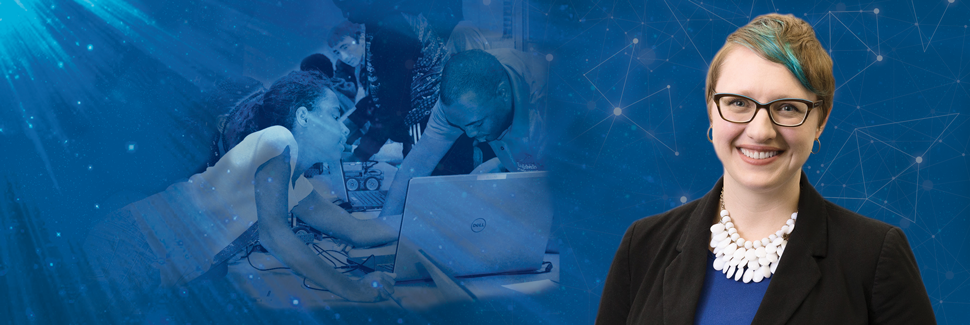
UF engineering professor Kristy Boyer’s latest NSF project uses intelligent virtual agents to study and foster collaboration skills in elementary school students.
Collaboration is a critical skill needed in many fields, but particularly in computer science, where many people often work together on a larger project. It is a skill that is not intrinsic; it must be learned. Bringing students together to share ideas tends to yield a familiar pattern: confident students become more confident, while less experienced students conclude that instead of their sharing ideas, they should defer to the kids who have better ones.
Kristy Boyer, Ph.D., an associate professor at the University of Florida’s Department of Computer & Information Science & Engineering, is the principal investigator on a new National Science Foundation research award that aims to change the way collaboration is taught, using – and teaching – computer science.
“If we can revolutionize the way kids learn to collaborate, I believe we can transform the faces of our classrooms and workplaces for the better, to be more diverse,” Dr. Boyer said. “It will be a hard and long-term undertaking, but I believe it is one that is long overdue.”
An expert in human-centered computing, Dr. Boyer will use animated computer characters called intelligent virtual agents to teach and support upper elementary students with best practices when it comes to constructive and equitable dialogue in a group setting. The agents are designed to engage in conversations with each other and with students. They can provide personalized support and incorporate every student’s ideas into the larger collaboration, in this case, a computer science project. They help teach the students how to put everyone’s best ideas forward.
“In an era when there is so much discussion in academia about what type of schools are most effective for learning, Dr. Boyer is looking at what type of learning fosters success,” said Forrest Masters, associate dean for research and facilities at UF’s Herbert Wertheim College of Engineering. “We know that students who learn how to collaborate in the classroom are more successful, in school and in the workforce. Dr. Boyer is cracking the code on how to teach that critical skill.”
Dr. Boyer’s research focuses on how natural language dialogue and intelligent systems can support human learning across educational contexts including within and outside the classroom. She earned her master’s degree in industrial and systems engineering at Georgia Institute of Technology and her Ph.D. in computer science at North Carolina State University. She joined the faculty at UF in 2015 during the UF Preeminence initiative and is part of UF’s interdisciplinary Online Learning Institute.
